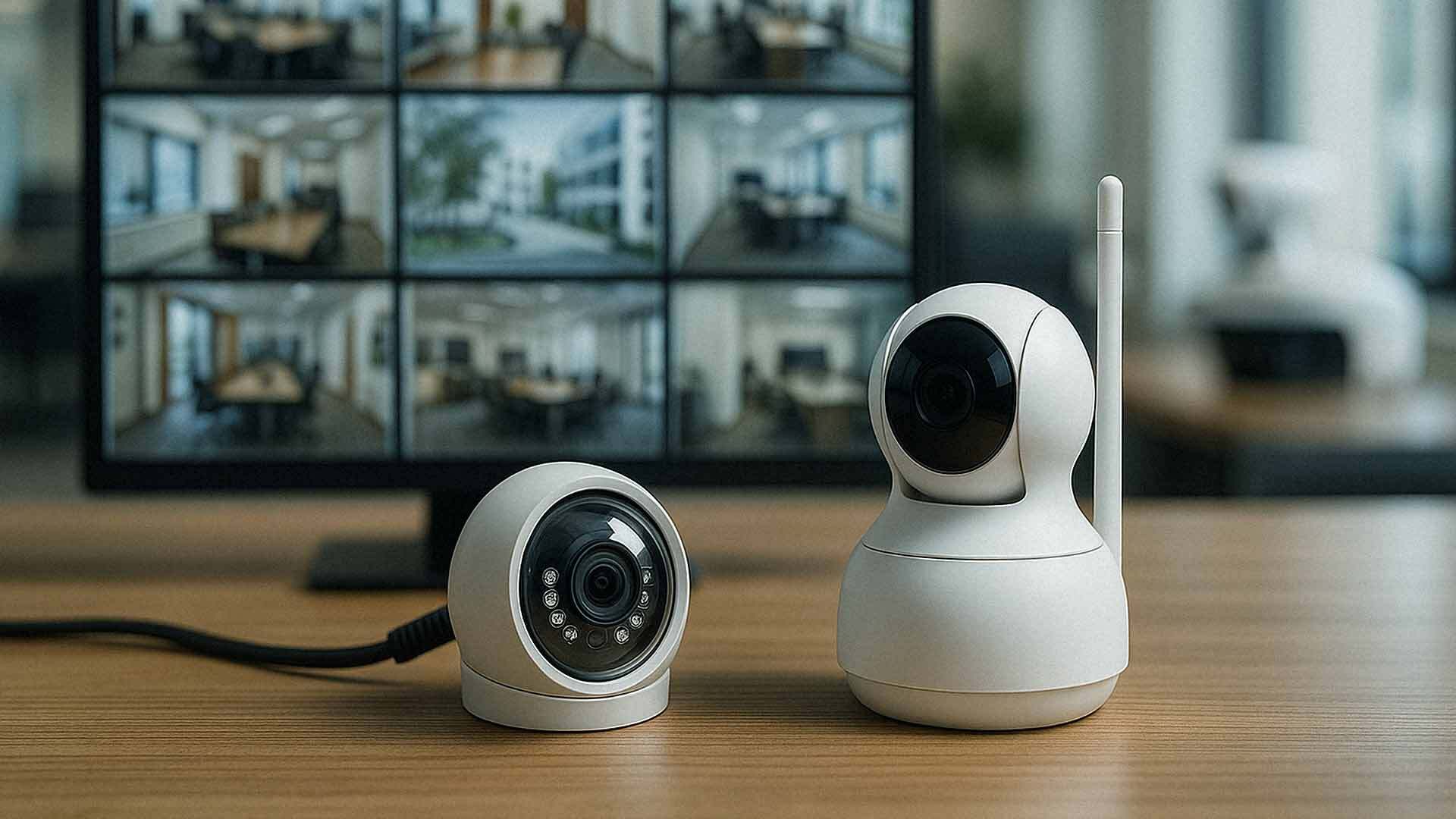Wired vs. Wireless Business Camera Surveillance: Which Is Right for Your Business?
August 14th, 2025 | 4 min. read

Security cameras are one of the most essential tools for protecting your business. They help deter crime, provide valuable evidence, and allow you to monitor operations in real time.
But when it comes to choosing a surveillance system, one question comes up again and again: should you go with wired or wireless cameras?
Both have their strengths and limitations, and the right choice depends on your environment, security needs, and budget. Let’s break down the differences so you can make an informed decision.
Why Your Surveillance Setup Matters
How the Right System Impacts Security and Operations
A well-designed surveillance system can do more than just record video. It can help with loss prevention, improve employee safety, monitor compliance, and even enhance customer experience.
Matching Technology to Business Needs
Choosing between wired and wireless is not about which is “better” overall. It is about which setup works best for your business size, layout, network capabilities, and long-term plans.
What Is a Wired Surveillance System?
How Wired Cameras Work
Wired surveillance systems connect each camera to a central recorder, typically a network video recorder (NVR) or digital video recorder (DVR), using cables. These cables provide both power and data transmission, ensuring a reliable connection.
Typical Features and Infrastructure Requirements
- Consistent, high-quality video feed
- No dependence on Wi-Fi for data transmission
- Requires professional installation with cable runs
- May need drilling and conduit for larger buildings
What Is a Wireless Surveillance System?
How Wireless Cameras Work
Wireless surveillance systems transmit video data over Wi-Fi or other wireless signals. Some are battery-powered, while others still require a power cable but no data cabling.
Typical Features and Connectivity Needs
- Easier installation without extensive cabling
- Can connect to cloud storage or local network recorders
- Performance depends on network speed and stability.
- Often integrates with mobile apps for remote viewing.
Pros and Cons of Wired Surveillance
Advantages of Wired Systems
- Reliable connection: Not affected by Wi-Fi interference or bandwidth fluctuations
- Consistent video quality: Ideal for high-resolution recording and significant storage needs
- Better for large-scale setups: Handles many cameras without signal degradation.
- No battery maintenance: Cameras receive constant power through cables
Disadvantages of Wired Systems
- More difficult installation: Requires running cables through walls and ceilings.
- Less flexibility for camera placement: Limited by cable routes
- Higher upfront costs: More labor and materials needed for installation
Pros and Cons of Wireless Surveillance
Advantages of Wireless Systems
- Easier installation: Fewer cables make setup quicker and less invasive
- Flexible placement: Cameras can be installed in areas without easy cable access
- Lower initial costs: Less labor-intensive than wired installations
- Scalable for small setups: Easy to add cameras over time
Disadvantages of Wireless Systems
- Dependent on Wi-Fi quality: Weak or congested networks can affect video quality
- Potential for signal interference: Other wireless devices can disrupt the connection
- Battery maintenance for some models: Requires regular charging or battery changes
- Limited range: Cameras must be within network coverage
Key Factors to Consider When Choosing
Installation Environment and Building Layout
If your building is under construction or being renovated, installing a wired system is easier since you can run cables during the build. In a finished space, wireless cameras may be less disruptive.
Network Reliability and Bandwidth
Wireless systems require a strong and stable network. If your Wi-Fi is inconsistent, wired cameras may be a safer choice.
Maintenance and Future Scalability
Wired systems require less ongoing maintenance, while wireless systems offer more flexibility if you expect to relocate or reconfigure your setup.
Budget and Long-Term Costs
Wired systems often cost more upfront due to installation, but may be more cost-effective over time. Wireless systems have lower initial costs but may require more maintenance or network upgrades.
Hybrid Systems: The Best of Both Worlds?
How Hybrid Solutions Work
Hybrid surveillance systems combine wired and wireless cameras in a single network. For example, you might use wired cameras in fixed, high-priority areas and wireless cameras for temporary coverage or hard-to-reach locations.
When a Hybrid Approach Makes Sense
Hybrid setups are ideal when you want the reliability of wired systems in key areas but also need the flexibility of wireless for specific locations or short-term projects.
Wired vs. Wireless Business Camera Surveillance: Final Recommendations
Choosing between wired and wireless surveillance depends on your specific business needs. Wired systems provide unmatched reliability and quality, making them an excellent choice for permanent, large-scale installations.
Wireless systems offer flexibility and easier installation, which works well for smaller businesses or locations where running cables is not practical.
In many cases, a hybrid solution delivers the best balance of performance, cost, and adaptability.
At AIS, we help businesses in Las Vegas and Southern California design and install office security systems that fit their unique needs.
Whether you choose wired, wireless, or a combination of both, our team can guide you through the options and create a system that works for you.
A true southerner from Atlanta, Georgia, Marissa has always had a strong passion for writing and storytelling. She moved out west in 2018 where she became an expert on all things business technology-related as the Content Producer at AIS. Coupled with her knowledge of SEO best practices, she's been integral in catapulting AIS to the digital forefront of the industry. In her free time, she enjoys sipping wine and hanging out with her rescue-dog, WIllow. Basically, she loves wine and dogs, but not whiny dogs.
Topics:



